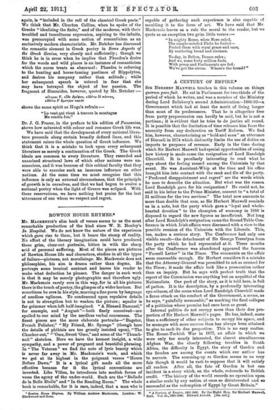ROWTON HOUSE RHYMES.* Mr. MioxinazrE's slim book of verses seems
to us the most remarkable production of the kind since W. E. Henley's In Hospital. We do not know the nature of the experience which gave rise to them, but it bears the stamp of reality. No effort of the literary imagination could have produced these grim, clear-cut portraits, bitten in with the sharp acid of personal suffering. Most of the pieces are pictures of Rowton House life and characters, studies in all the types of failure—pictures, not moralisings. Mr. Mackenzie does not philosophise, his aim is drama rather than dogma. He portrays some ironical contrast and leaves his reader to make what deduction he pleases. The danger in such work is that it may be merely photographic and therefore ugly. Mr. Mackenzie rarely errs in this way, for in all his pictures there is the touch of poetry, the glimpse of a wider horizon. But sometimes he errs in his style, marring a fine poem by language of needless ugliness. To condescend upon repulsive details is not to strengthen but to weaken the picture ; squalor is far grimmer when left half-imagined. "A Blessed Damozel," for example, and " August "—both finely conceived—are spoiled to our mind by the needless verbal coarseness. The finest pieces are the more elaborate portraits—" Bagster, French Polisher," " My Friend, Mr. Spunge " (though here the details of phthis' is are too grossly insisted upon), "The Chucker-out," " 'Ome, Sweet 'Ome," and some of the " Thumb- nail" sketches. Here we have the keenest insight, a wide sympathy, and a power of pregnant and beautiful phrasing. In " The Veteran" we find the note of lyric beauty which is never far away in Mr. Mackenzie's work, and which we get at its highest in the poignant verses "Hours Before Dawn." It is a, lyrical gift made all the more effective because for it the lyrical conventions are inverted. Like Villon, he introduces into modish forms of verse the agony of the under-world. Such are the "Ballade de la Belle Etoile" and " In the Reading Room." The whole book is remarkable, for it is rare, indeed, that a man who is
• Rowton House Rhymes. By William Andrew Mackenzie. London: W. Blackwood and Sons.
capable of gathering such experience is also capable of moulding it to the form of art. We have said that Mr. Mackenzie leaves as a rule the moral to the reader, but we quote as an exception two grim little verses :—
" In mighty Rome, when Nero ruled, The simple-minded Plebs he fooled— Pooled them with royal grace and ease, By scattering bread and circuses.
To-day, in Briton, Demos rules ; And we, some forty million fools, With pomp and Parliaments are fed :
We've got the circus. Where's the bread?"






































 Previous page
Previous page